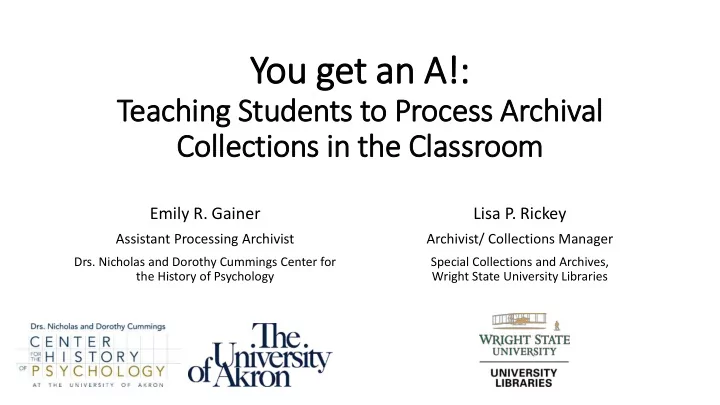

You u get t an n A!: Teaching g Students s to o Process s Archival Collections s in n the e Classroom Emily R. Gainer Lisa P. Rickey Assistant Processing Archivist Archivist/ Collections Manager Drs. Nicholas and Dorothy Cummings Center for Special Collections and Archives, the History of Psychology Wright State University Libraries
Museums & Archives Certificate Program at the University of Akron • Introduction to museums & archives. • Provides undergraduate students with basic skills. • Prepares them for work in museum & archives professions and for graduate study in these areas. • Foundations of Museums & Archives I (3 credits) • Foundations of Museums & Archives II (3 credits) • Capstone Experience (3 credits) • Specialization Electives (9 credits)
Foundations of Museums & Archives I Week 1: Museums intro Week 8: Metadata Week 2-3: Museums: types, visitors, Week 9: Accessioning & appraisal work, tasks, staff Week 10: Finding aids, storage, Week 4: Archives intro preservation Week 5: Archives: types & contents Week 11-12: Digitization Week 6: Archives work, tasks, staff. Week 13: Policies, donors, public Arrangement. relations Week 7: Midterm Week 14-15: Final project
Final project • Process an archival collection (50%) • Group processing • 6-8 records storage boxes per group • Blog post (25%) • Summative reflection (25%)
Summative e reflections If I worked in an archive I When I first opened the boxes think I would be involved in and saw no organization I was digitization. overwhelmed. I think it is very exciting to see all the materials and objects from history and By the end of this process, I am actually handle them. completely confidant that archival work is something that I would love doing. Creating an arrangement also proved somewhat difficult…I wonder if in the future I will I would simply be become better at familiarizing excited to be working myself with collections before Personally, in reality, this is not in a place where you processing them, or if this is the what I would do for a job, either get to encounter kind of problems that all archivists in Archives or Museums. have to deal with. pieces of history every day.
Is Is it t worth h it? Processed 8 collections housed in 130 document cases described by 8 finding aids during 4 semesters by 32 students
Public History Concentration, Master of Arts in History, Wright State University • Graduate students interested in archival administration or museum management careers • Undergrad backgrounds in history, anthropology, religion, others • Both theoretical and practical training from working professionals • Full graduate degree program (38 credit hours) • Required courses include: • Academic core history courses (12 credits) • Intro’s to: Public History (3), !rchives (3), Museums (3) • Internship (1 credit) and capstone project (1 credit) • Advanced public history courses & electives (15 credits), including: • HST 7800: Advanced Archives (3 credits)
HST 7800: Advanced Problems in Archival Work aka !dvanced !rchives aka “The Processing Class” • Arrangement schemes • Controlled access headings • Processing plans • Archives Space • Privacy and restrictions • Backlogs and Reappraisal • Preservation • Prioritization • Challenging formats • MPLP • Finding aid elements (DACS) • Extensible Processing • Electronic records processing • Post-processing tasks, such as • Dissemination • Additions processing • Donor relations • EAD and MARC
HST 7800 Assignments • Processing plan and supply estimate (10%) • Preliminary finding aid (10%) • Electronic records processing (15%) • Completed collection and finding aid (50%) • Typically 4-6 record center boxes per student (depending on year) • Blog post visual aids (5%) & optional extra credit text • Participation (10%) including • In-class discussions and hands-on processing work • Archives Space data entry (in-class activity) • Discards summary
Processing in a Classroom Setting: Considerations Archivists Students Volunteers, Student !sst’s Motivation Appropriately processed Learning, experience, grades Genuine caring, meaningful collections ready for access work, paycheck Interest High! Eager to provide access Varies: career goals, reasons Varies for taking course (topic, schedule, coercion?), collection topic Skill High! We do this a lot Varies: natural ability, interest Varies Education Grad school training (+exp) (Some) grad school training Varies Supervision Depends: we do this with Much-needed, check often Usually much-needed, check varying degrees of oversight often Collections No need to do same size, Should all have about the No need to do same size, type, or complexity same difficulty/work type, or complexity
What We Accomplished • 2x teaching the course • 11 students • 16 collections processed • 16 finding aids written • (17 counting the e-records exercise) • Over 50 linear feet of new materials available • Lots of learning (hopefully!)
Processing in the Classroom: Give a Fish vs. Teaching to Fish • Goal: Obtain a fish • Get collections processed • Goal: Teach fishing • Teach students to process • We want the “fish,” but we also want to teach the fishermen. • Everybody wins This Photo by Unknown Author is licensed under CC BY-SA-NC
Contact info: Emily Gainer Thank you! erlockh@uakron.edu Lisa Rickey lisa.rickey@wright.edu
Recommend
More recommend